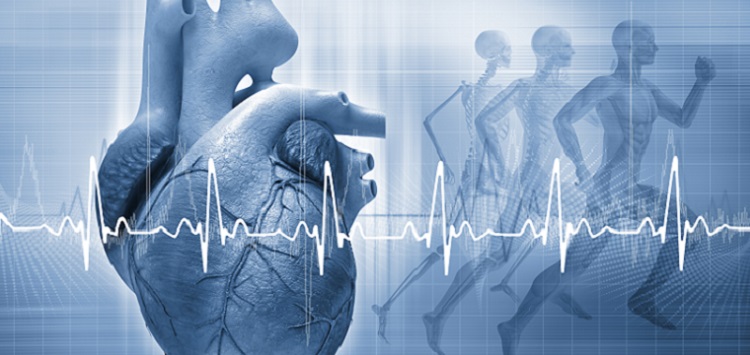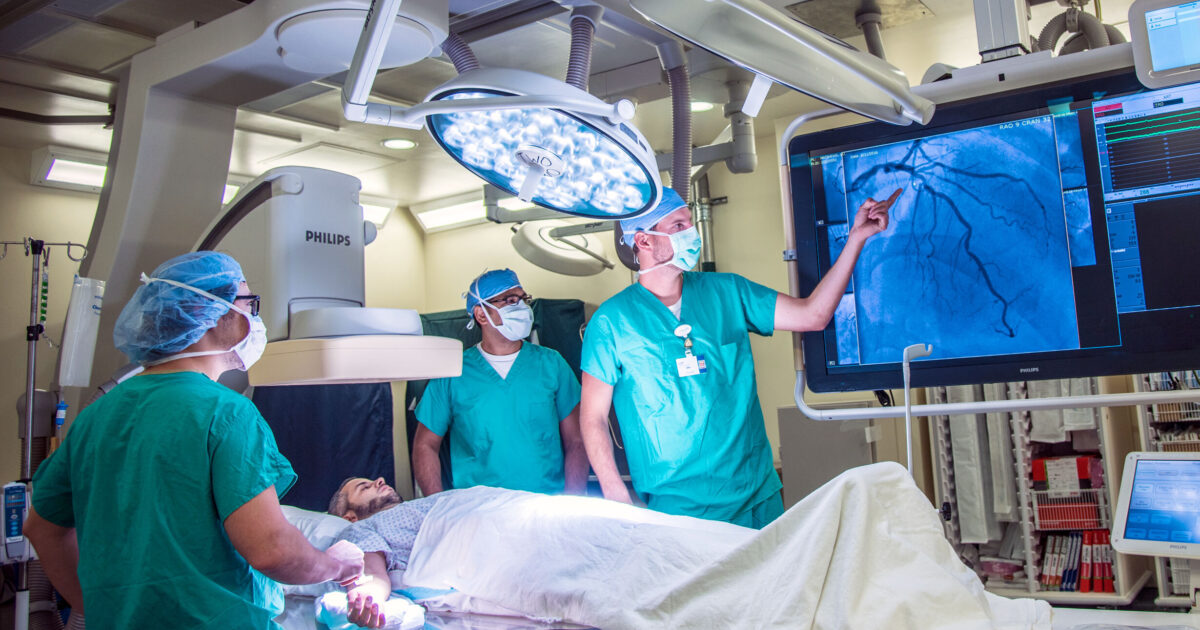The ultimate heart health checklist from Cardiology Jupiter
The ultimate heart health checklist from Cardiology Jupiter
Blog Article
Understanding the Relevance of Cardiology in Modern Healthcare Providers
Cardiology plays a critical role in modern-day health care, specifically as heart problem proceeds to be the leading cause of death worldwide. Advances in diagnostics and therapy have actually transformed person care, enabling earlier treatments and enhanced outcomes. The change in the direction of precautionary cardiology empowers individuals to manage their health and wellness proactively. As modern technology remains to advance, the combination of innovative solutions might even more redefine cardiology's effect on public health, triggering a better evaluation of emerging patterns and their effects.
The Frequency of Heart Problem and Its Effect On Public Health
Although heart illness remains the leading cause of death around the world, its influence extends much beyond private clients to influence public health systems and economic situations. The high occurrence of cardiovascular disease positions a considerable strain on healthcare sources, necessitating enhanced funding for therapy, avoidance, and recovery programs. Public wellness campaigns should attend to threat elements such as weight problems, cigarette smoking, and sedentary lifestyles, which contribute substantially to the increasing occurrence of heart conditions.Moreover, the financial burden connected with heart problem is tremendous, incorporating not only direct medical costs but also indirect expenses associated with shed productivity and early mortality. Areas deal with obstacles in handling these prices, usually causing differences in medical care access and results. As the populace ages and lifestyle-related risks remain to intensify, the urgency for reliable cardiology interventions comes to be extremely important. Subsequently, dealing with heart disease is not only an issue of individual health however also a vital public health priority.
Developments in Heart Diagnostics and Imaging Techniques
Current developments in cardiac diagnostics and imaging strategies have revolutionized the field of cardiology, boosting the capability to discover and keep an eye on heart problem. Techniques such as cardiac MRI, CT angiography, and echocardiography have actually become significantly advanced, offering comprehensive photos of cardiac frameworks and functions. These methods permit for the early recognition of problems like coronary artery illness, cardiac arrest, and valvular disorders.Moreover, developments in non-invasive diagnostics, such as wearable innovation and remote surveillance devices, have actually empowered patients and health care companies. These devices facilitate real-time monitoring of heart rhythms and various other essential signs, causing timely interventions. Additionally, man-made intelligence is being incorporated into imaging evaluation, enhancing accuracy and effectiveness in medical diagnosis.
Advancements in Therapy Choices for Heart Issues
Recent advancements in cardiology have actually led to considerable technologies in therapy options for heart conditions. These include innovative medical techniques that improve step-by-step results and arising drugs that provide new methods for therapy. As the area advances, these advancements play a crucial duty in improving person treatment and end results.
Advanced Surgical Techniques
Innovations in medical techniques have actually transformed the landscape of cardiology, supplying new hope for clients with heart disease. Minimally invasive procedures, such as catheter-based interventions, have significantly reduced healing times and medical facility remains. Methods like robotic-assisted surgical treatment boost accuracy, enabling doctors to navigate complex physiological structures with higher accuracy. Improvements in imaging technology promote real-time visualization during procedures, enhancing outcomes. Transcatheter aortic shutoff replacement (TAVR) exhibits an innovation in dealing with aortic stenosis, making it possible for valve substitute without open-heart surgery. Furthermore, hybrid techniques that integrate surgical and catheter-based methods give tailored options for various heart concerns. These innovative surgical techniques not just boost patient safety and security yet also broaden treatment choices, highlighting the essential role of technology in modern cardiology methods.
Arising Therapies and medications
As the landscape of cardiology remains to advance, emerging medicines and therapies play a critical function in improving treatment options for heart disease. Developments such as unique anticoagulants and progressed lipid-lowering agents have actually transformed the administration of heart diseases, significantly decreasing client morbidity and death. Furthermore, the advancement of gene therapies and regenerative medication offers promising avenues for dealing with problems formerly regarded irreparable. Scientific trials are consistently revealing the effectiveness of these treatments, pressing the limits of traditional treatments. The assimilation of digital health technologies helps with tailored medicine, allowing for customized treatment plans based on genetic and lifestyle aspects. Collectively, these innovations highlight the dynamic nature of cardiology, enhancing individual end results and redefining requirements of treatment in modern medical care.
The Function of Preventive Cardiology in Individual Care
Preventive cardiology plays a necessary duty in client treatment by concentrating on the identification of risk aspects that add to cardiovascular disease. Via lifestyle modification techniques and very early detection strategies, health care suppliers can efficiently decrease the occurrence of cardiovascular occasions - Cardiology Jupiter. This aggressive technique not just improves person results but additionally advertises lasting health
Risk Element Recognition
While heart diseases remain a leading root cause of morbidity and mortality worldwide, efficient risk element identification offers as a foundation of preventative cardiology. Identifying threat aspects such as high blood pressure, diabetes, family, and hyperlipidemia history is essential for early intervention. Healthcare experts utilize numerous evaluating approaches to examine these aspects, permitting customized safety nets. Furthermore, recognizing a patient's way of living choices, such as smoking and physical lack of exercise, additionally notifies danger evaluations. This thorough assessment allows clinicians to establish personalized care strategies intended at mitigating dangers. By prioritizing threat aspect identification, medical care systems can enhance client end results and minimize the overall burden of heart diseases, inevitably adding to improved public health techniques and resource allowance.
Way Of Living Adjustment Strategies
A plethora of studies highlights the essential function of way of life alteration strategies in minimizing heart disease threat. These approaches encompass nutritional modifications, enhanced exercise, smoking cigarettes cessation, and weight administration. By adopting a heart-healthy diet plan abundant in fruits, veggies, entire grains, and lean proteins, people can decrease cholesterol levels and blood pressure. Routine exercise reinforces the heart and enhances total cardio health and wellness. Additionally, stopping smoking cigarettes greatly minimizes the risk of cardiovascular disease and enhances recuperation rates for those with status quo. Weight monitoring further contributes to cardiovascular health and wellness by reducing various other danger variables such as diabetes mellitus and hypertension. click here for info Executing these way of life changes not only promotes private well-being however likewise functions as a foundation of precautionary cardiology in patient care.
Early Detection Methods
Way of life adjustments substantially contribute to decreasing cardio condition threats, however they are most reliable when coupled with early detection techniques. Precautionary cardiology emphasizes the importance of recognizing potential heart concerns prior to they escalate into major conditions. Methods such as blood stress surveillance, cholesterol screening, and advanced imaging technologies like echocardiograms play essential duties in evaluating cardio health. Biomarkers and genetic screening likewise boost the precision of early discovery, enabling tailored preventive approaches. Regular heart risk analyses equip doctor to interfere proactively, potentially stopping cardiac arrest and strokes (Cardiology care). By incorporating these early detection techniques into routine care, people can gain from timely way of living interventions and targeted treatments, inevitably enhancing end results and enhancing top quality of life
Integrating Innovation Into Cardiology Practices
As improvements in modern technology continue to improve numerous fields, the assimilation of ingenious devices and systems right into cardiology practices has ended up being crucial for boosting person care and outcomes. Telemedicine platforms permit cardiologists to check clients remotely, improving accessibility to care while lowering the concern on medical care centers. Wearable tools, such as smartwatches, make it possible for continual heart price monitoring, informing both medical professionals and patients to possible concerns in real-time. Additionally, expert system (AI) is being used to assess huge amounts of heart data, aiding in very early medical diagnosis and customized treatment plans. Advanced imaging techniques, consisting of 3D echocardiography, enhance visualization of heart structures, causing more precise interventions. Electronic wellness documents (EHRs) improve individual information administration, ensuring that cardiologists have immediate access to vital information. Together, these technical improvements are transforming cardiology, promoting aggressive monitoring and enhanced health results for clients with cardiovascular conditions.
The Significance of Patient Education and Engagement
Patient education and learning and engagement play a pivotal duty in the management of cardio health. By outfitting people with understanding concerning their conditions, therapy alternatives, and way of life adjustments, doctor encourage individuals to take an energetic duty in their care. This aggressive technique can result in enhanced adherence to prescribed medications, dietary adjustments, and exercise routines, ultimately decreasing the danger of complications.Engagement additionally cultivates a strong patient-provider connection, urging open communication and trust. When individuals feel notified and entailed, they are more probable to voice concerns and ask questions, which can cause far better clinical outcomes. Furthermore, educational resources, such as workshops or digital platforms, can enhance understanding and promote self-management strategies. Generally, prioritizing person education and engagement is crucial for improving cardio health, enhancing lifestyle, and minimizing healthcare costs connected with heart diseases.
Future Trends in Cardiology and Their Potential Influence

Frequently Asked Questions
What Lifestyle Changes Can Minimize Cardiovascular Disease Risk?
The existing question addresses lifestyle modifications that can substantially lower heart illness threat. Cardiologist near me. Embracing a balanced diet, taking part in routine exercise, preserving a healthy and balanced weight, handling anxiety, and staying clear of tobacco can significantly enhance cardiovascular health
Just How Can I Identify Very Early Signs of Heart Issues?
Recognizing early indicators of heart troubles includes monitoring signs and symptoms such as breast discomfort, lack of breath, fatigue, and irregular heartbeat. Prompt understanding of these signs can trigger needed clinical analysis and treatment for much better outcomes.
What Are the Distinctions In Between Cardiologists and Cardiac Surgeons?
The distinctions in between visit homepage cardiologists and cardiac doctors lie in their roles; cardiologists largely identify and take care of heart disease with non-invasive methods, while cardiac surgeons carry out procedures to correct architectural heart issues. Each plays a vital, distinctive duty.

How Typically Should I Obtain My Heart Wellness Checked?
The frequency of heart medical examination differs based on private danger aspects. Usually, adults should undergo examinations every one to 2 years, while those with status quo might need more frequent assessments as encouraged by medical care experts.
What Role Does Genes Play in Heart Problem Risk?
Genes significantly i loved this influences heart illness danger, with domestic patterns indicating acquired conditions. Particular genetics can incline people to high blood pressure, cholesterol problems, and various other cardiovascular troubles, highlighting the value of hereditary screening in examining heart wellness. Heart illness remains the leading reason of death globally, its effect expands much past specific clients to affect public health and wellness systems and economic climates. Public wellness efforts need to resolve danger factors such as obesity, smoking, and inactive lifestyles, which contribute significantly to the climbing incidence of heart conditions.Moreover, the financial concern connected with heart condition is immense, including not only direct clinical expenses however additionally indirect costs connected to shed performance and premature mortality. Preventative cardiology plays an important function in person treatment by focusing on the identification of threat aspects that contribute to heart illness. Artificial intelligence (AI) and device discovering are boosting diagnostics and patient tracking, allowing very early detection of heart diseases. The distinctions in between cardiologists and heart cosmetic surgeons exist in their roles; cardiologists primarily manage and diagnose heart problems via non-invasive approaches, while cardiac specialists do surgical procedures to correct architectural heart concerns.
Report this page